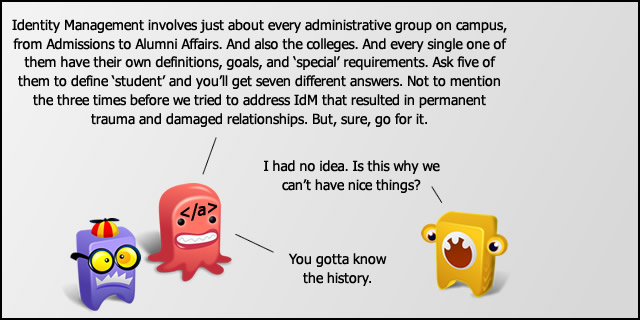The litany of inane dysfunction in higher education never ends, does it? And this one is one of the worst. I call it "Special Snowflake Syndrome" (SSS) and it comes from the mistaken belief that you or your unit are so special and so unique that it would be physically impossible to do things the same as everyone else, or use the same tools as everyone else.
And sadly, this isn't as funny as it is real. It comes from a history of weak central power, which is all too common all over higher education. Our 'central' IT organization was for a long time little more than a collection of historically autonomous fiefdoms (HAFs), none of which ever really had to pay too much mind to the CIO.
Though that is changing, it is not happening without some resistance. Given our history, it is not only difficult to introduce standards, but it is also nearly impossible to enforce them. The slightest resistance basically derails any initiative to introduce positive change.
We should have introduced spankings years ago.
What really irks me most about this whole situation is not that we have people who refuse to recognize the value and usefulness of IT standards and best practices. No, what irks me the most is the fact that we have people working here in higher education IT who put their own interests ahead of the needs and mission of the university. They don't care if the university needs a document management system* or not; if it is a shiny object to them, they have no problem spending hundreds of thousands of dollars and years' worth of effort and resources on it - particularly if it enlarges their fiefdom.
Higher Education IT is a service organization within a service organization. We are here to provide IT services to an organization that is providing badly needed educational services to society.
If you aren't here to serve, then you really don't belong here.
There, I said it! I've been itching to say it for weeks! Woohoo!
Most of the people I work with sincerely believe in the role and mission of higher education (in my case,
public higher education). As much as I might disagree with those people on specifics, I respect them for choosing service over profit, power, and whatever other wonderful things people in "the real world" get. But for those few who seem to think that working here is an opportunity to put themselves first, I have no respect whatsoever.
There's way too much to say about this than I can cover here, but I'll be saying a lot more on this in upcoming strips. I would appreciate knowing if you feel the same way; if so, leave a comment.
*I'm only picking on document management as a cover for the real shiny objects certain people are obsessed with. At this point in time, I have as yet to form any negative opinions about the document management initiative.




















































